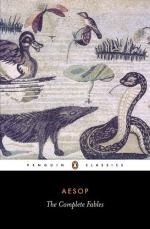The Swan is said to sing but once in its life—when it knows that it is about to die. A certain man, who had heard of the song of the Swan, one day saw one of these birds for sale in the market, and bought it and took it home with him. A few days later he had some friends to dinner, and produced the Swan, and bade it sing for their entertainment: but the Swan remained silent. In course of time, when it was growing old, it became aware of its approaching end and broke into a sweet, sad song. When its owner heard it, he said angrily, “If the creature only sings when it is about to die, what a fool I was that day I wanted to hear its song! I ought to have wrung its neck instead of merely inviting it to sing.”
THE SNAKE AND JUPITER
A Snake suffered a good deal from being constantly trodden upon by man and beast, owing partly to the length of his body and partly to his being unable to raise himself above the surface of the ground: so he went and complained to Jupiter about the risks to which he was exposed. But Jupiter had little sympathy for him. “I dare say,” said he, “that if you had bitten the first that trod on you, the others would have taken more trouble to look where they put their feet.”
THE WOLF AND HIS SHADOW
A Wolf, who was roaming about on the plain when the sun was getting low in the sky, was much impressed by the size of his shadow, and said to himself, “I had no idea I was so big. Fancy my being afraid of a lion! Why, I, not he, ought to be King of the beasts”; and, heedless of danger, he strutted about as if there could be no doubt at all about it. Just then a lion sprang upon him and began to devour him. “Alas,” he cried, “had I not lost sight of the facts, I shouldn’t have been ruined by my fancies.”
THE PLOUGHMAN AND THE WOLF
A Ploughman loosed his oxen from the plough, and led them away to the water to drink. While he was absent a half-starved Wolf appeared on the scene, and went up to the plough and began chewing the leather straps attached to the yoke. As he gnawed away desperately in the hope of satisfying his craving for food, he somehow got entangled in the harness, and, taking fright, struggled to get free, tugging at the traces as if he would drag the plough along with him. Just then the Ploughman came back, and seeing what was happening, he cried, “Ah, you old rascal, I wish you would give up thieving for good and take to honest work instead.”
MERCURY AND THE MAN BITTEN BY AN ANT
A Man once saw a ship go down with all its crew, and commented severely on the injustice of the gods. “They care nothing for a man’s character,” said he, “but let the good and the bad go to their deaths together.” There was an ant-heap close by where he was standing, and, just as he spoke, he was bitten in the foot by an Ant. Turning in a temper to the ant-heap he stamped upon it and crushed hundreds of unoffending ants. Suddenly Mercury appeared, and belaboured him with his staff, saying as he did so, “You villain, where’s your nice sense of justice now?”




